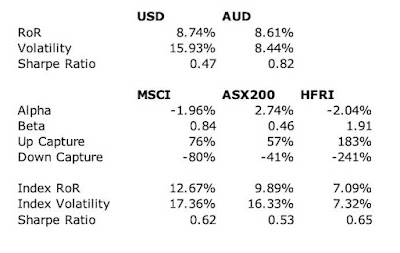I am thinking of setting up a transition to retirement pension (TTR pension). This allows you to receive regular payouts from your superannuation once you reach the age of 60 even though you are still working. I will be 60 years old in about 6 weeks time! There are lots of strategies this can be used. In my case, I am thinking to continue working full time at least for the next year and to recontribute all the payout to superannuation as non-concessional contributions (post-tax contributions). This has two advantages:
- It will convert money that was contributed as concessional contributions (at the 15% or 30% contributions tax rate) and earned as investment returns into non-concessional contributions. If my children inherit some of my superannuation when they are past the age of 18 they then won't need to pay tax on this part of the payout. The "death tax" is only on concessional contributions and fund earnings.
- Once I hit the transfer balance cap, of currently $1.9 million, I can contribute the money to my wife's superannuation instead. I am currently at $1.7 million and she is at $800k. So, there is still a lot of unused capacity there.
When you retire or reach age 65 you can transfer money up to the transfer balance cap into a zero taxed pension account. Money over the limit stays in an accumulation account where earnings are taxed at 15% (10% for long term CGT). The TTR pension does not affect the calculation of the transfer balance cap unless you are still holding it at age 65 when it becomes a regular tax free pension account.
My Unisuper account is close to 100% concessional contributions and earnings. So, I would start with that and transfer $600k to a pension account and pay out 10% of it each year, which is the maximum withdrawal rate. You have to leave some money in the accumulation account to receive new contributions... But actually 60% of my SuperGuardian account is also concessional contributions and earnings, and so it would make sense to transfer $400k from that into a TTR pension account too. So I would be withdrawing $100k per year and recontributing. The reason I wouldn't withdraw the maximum annual non-concessional contribution level of $110k is because my employer contributes more than the allowed cap on concessional contributions each year and the excess becomes non-concessional contributions.*
The downside to recontributing to my wife's superannuation is that I could make those contributions from non-superannuation money resulting in getting even more money into super. After all, even if you have more than $1.9 million in super, the amount above the limit is concessionally taxed compared to non-super investments.** But right now I am not making those contributions. Instead, I have been building up a pile of cash offsetting our mortgage. This is partly to reduce our interest bill but also part of a plan to buy a more expensive house in the future. So, as long as I was planning on saving to buy a house, I wouldn't make non-concessional contributions to her account.
Anyway, I sent an email to Unisuper yesterday expressing my interest in TTR pensions and asking what the next step is.
Originally, I planned on switching to half time work when I reached 60 years old, but I seem to have fallen victim to the one more year syndrome. Seems silly to sacrifice $120k in pre-tax salary and superannuation just to have a bit easier time in the teaching half of my year. Also, my university is enacting a major cost-cutting exercise that likely will see more than 500 jobs cut in total. Academic jobs will not be cut till next year. They are not putting in a voluntary redundancy scheme. But I figure that if I am made redundant then I will get a bigger payout if I am still working full time. I could be wrong about that.
* That's why my Unisuper account isn't 100% concessional contributions and earnings.
** The government plans to tax superannuation in excess of a $3 million threshold at higher rates that include unrealised capital gains. But I think the senate will not pass that legislation and we are still a long way from the $3 million level.








































